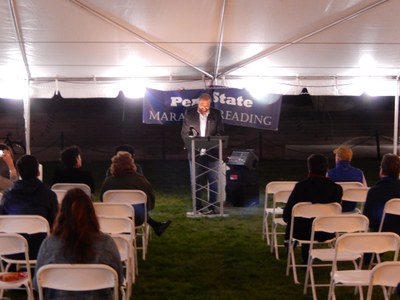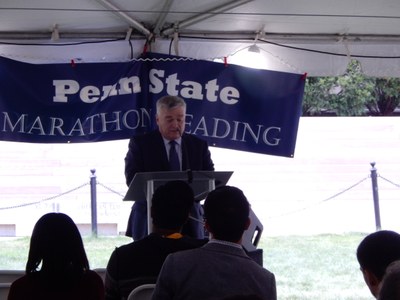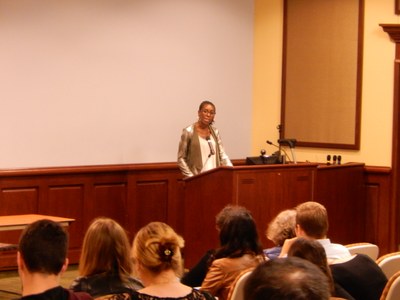Alchemy of Nostalgia: The 2017 Marathon Read

CALS Undergraduate Intern Philip Chwistek reflects on his experience at the 2017 Marathon Read: First Books.
It’s around 10:00 pm. I’m standing under a canopy lit up by torchlights, listening to a local author read the first chapter of his first book. He mentions it is "nostalgic" to recall the process of designing the cover, a fact that I scribble into my notes. Just as he finally reaches the point in the story explaining why the main character’s father is missing an ear, a student wearing a tracksuit walks over to me with his jaw dropped in disbelief. He hovers next to me for a few moments, saying nothing.
"Is that Frank O’Hara?" he finally asks me in a whisper.
I stare at him in horror. "Hasn’t Frank O’Hara been dead for, like, 50 years?"
"What are you talking about?" He slowly raises his arm and points to a tall man sitting in the audience. "He’s right there."
For a few moments, I wondered if I had stumbled upon some kind of wicked resurrection of dead poets. The scenery seemed about right.
"You mean the guy sitting in the second row?"
"Yeah," he says, "Franco Harris."
"Oh!" I laugh, "the football player? Yeah, he’ll be reading in about 10 minutes."
*
Earlier that day, planted underneath the same tent on the lawn outside of Pattee Library, students, faculty, alumni, and members of the community gathered to celebrate "First Books," the theme of the 2017 annual Marathon Read. Co-sponsored by the Center for American Literary Studies, the event kicked off at noon on September 7th and continued for 24 hours, propelled by volunteers reading aloud from books such as J.D. Salinger’s Catcher in the Rye, Lyrae Van Clief-Stefanon’s Black Swan, and Ernst Cline’s Ready Player One.
 Franco Harris was not the only guest of honor who participated in the event. When asked to reflect on this year’s theme, President Barron, a seasoned Marathon Reader, remarked, "When I go to a bookstore, often times I look for the ‘First Books’ section. I find those books to be less formulaic and more innovative." Barron’s statement points to a quality unique to debut works: the author’s inexperience. Although a lack of experience can often result in poor craftsmanship, leverage works both ways. There is a certain adolescent charm attached to an author’s debut, one that stems from the absence of a defined style. This fluidity can allow unconventional elements to emerge, especially those that would otherwise fritter away as the author solidifies their literary identity.
Franco Harris was not the only guest of honor who participated in the event. When asked to reflect on this year’s theme, President Barron, a seasoned Marathon Reader, remarked, "When I go to a bookstore, often times I look for the ‘First Books’ section. I find those books to be less formulaic and more innovative." Barron’s statement points to a quality unique to debut works: the author’s inexperience. Although a lack of experience can often result in poor craftsmanship, leverage works both ways. There is a certain adolescent charm attached to an author’s debut, one that stems from the absence of a defined style. This fluidity can allow unconventional elements to emerge, especially those that would otherwise fritter away as the author solidifies their literary identity.
Other veteran Marathon Readers echoed Barron’s sentiment. "First books are risky and intensely personal," said Sarah Williams, an undergraduate student who read an excerpt from Catcher in the Rye. Identifying another layer of depth to first books, Williams’ comment reminds us that the plunge into authorship is an uncertain affair. In terms of publishing, first books are frequently one of the few opportunities authors have to establish footing in a fiercely competitive environment. The prospect of publishing a debut novel seems even more intimidating when coupled with the painstaking creation of a first work, as portrayed by J.D. Salinger’s ten-year process of bringing Holden Caulfield to the page. However, every writer who wishes to be published has to take this leap of faith, and as stated by Williams, reading firsts books can be “inspirational” in this matter, "especially for an aspiring author."
As Catcher in the Rye came to a close Thursday evening, volunteers and audience members packed into Foster Auditorium for a quick interlude, where Lyrae Van Clief-Stefanon, the author of Black Swan, opened the Mary E. RollingReading Series for this academic year. Van Clief-Stefanon, who completed her MFA in Poetry at Penn State in  1999 and whose second book, Open Interval, led her to be a finalist for the National Book Award, read selections of her own poetry and discussed her experiences in a Q&A session. Promptly after the conclusion of Van Clief-Stefanon’s reading, the Marathon Read resumed outside as creative writing students, many of whom were sharing their work publicly for the first time, shared the stage with veteran authors revisiting passages from their first books. Narratives ranged from a young man caught in the 60s folk music revival to a re-imagination of Calypso as a Jamaican woman. Andy De La Fuente, a student attending his first Marathon Read, aptly recognized the night’s dynamics: "It’s quite interesting to see people probably bearing a lot of nostalgia reading next to those who are holding back first-time excitement. It almost comes full circle."
1999 and whose second book, Open Interval, led her to be a finalist for the National Book Award, read selections of her own poetry and discussed her experiences in a Q&A session. Promptly after the conclusion of Van Clief-Stefanon’s reading, the Marathon Read resumed outside as creative writing students, many of whom were sharing their work publicly for the first time, shared the stage with veteran authors revisiting passages from their first books. Narratives ranged from a young man caught in the 60s folk music revival to a re-imagination of Calypso as a Jamaican woman. Andy De La Fuente, a student attending his first Marathon Read, aptly recognized the night’s dynamics: "It’s quite interesting to see people probably bearing a lot of nostalgia reading next to those who are holding back first-time excitement. It almost comes full circle."
 Upon reflection, my instincts were correct: the Marathon Read was a resurrection, just not the kind to summon Frank O’Hara from beyond the grave (though I’m sure some faculty members would welcome it). Instead, the event resurrected memories that, regardless of whether they pertained to writing a debut novel or reading Catcher in the Rye as a teenager, created opportunity for others to transmute that energy and establish their own 'firsts.'
Upon reflection, my instincts were correct: the Marathon Read was a resurrection, just not the kind to summon Frank O’Hara from beyond the grave (though I’m sure some faculty members would welcome it). Instead, the event resurrected memories that, regardless of whether they pertained to writing a debut novel or reading Catcher in the Rye as a teenager, created opportunity for others to transmute that energy and establish their own 'firsts.'

CALS Undergraduate Intern Philip Chwistek reflects on his experience at the 2017 Marathon Read: First Books.
It’s around 10:00 pm. I’m standing under a canopy lit up by torchlights, listening to a local author read the first chapter of his first book. He mentions it is "nostalgic" to recall the process of designing the cover, a fact that I scribble into my notes. Just as he finally reaches the point in the story explaining why the main character’s father is missing an ear, a student wearing a tracksuit walks over to me with his jaw dropped in disbelief. He hovers next to me for a few moments, saying nothing.
"Is that Frank O’Hara?" he finally asks me in a whisper.
I stare at him in horror. "Hasn’t Frank O’Hara been dead for, like, 50 years?"
"What are you talking about?" He slowly raises his arm and points to a tall man sitting in the audience. "He’s right there."
For a few moments, I wondered if I had stumbled upon some kind of wicked resurrection of dead poets. The scenery seemed about right.
"You mean the guy sitting in the second row?"
"Yeah," he says, "Franco Harris."
"Oh!" I laugh, "the football player? Yeah, he’ll be reading in about 10 minutes."
*
Earlier that day, planted underneath the same tent on the lawn outside of Pattee Library, students, faculty, alumni, and members of the community gathered to celebrate "First Books," the theme of the 2017 annual Marathon Read. Co-sponsored by the Center for American Literary Studies, the event kicked off at noon on September 7th and continued for 24 hours, propelled by volunteers reading aloud from books such as J.D. Salinger’s Catcher in the Rye, Lyrae Van Clief-Stefanon’s Black Swan, and Ernst Cline’s Ready Player One.
 Franco Harris was not the only guest of honor who participated in the event. When asked to reflect on this year’s theme, President Barron, a seasoned Marathon Reader, remarked, "When I go to a bookstore, often times I look for the ‘First Books’ section. I find those books to be less formulaic and more innovative." Barron’s statement points to a quality unique to debut works: the author’s inexperience. Although a lack of experience can often result in poor craftsmanship, leverage works both ways. There is a certain adolescent charm attached to an author’s debut, one that stems from the absence of a defined style. This fluidity can allow unconventional elements to emerge, especially those that would otherwise fritter away as the author solidifies their literary identity.
Franco Harris was not the only guest of honor who participated in the event. When asked to reflect on this year’s theme, President Barron, a seasoned Marathon Reader, remarked, "When I go to a bookstore, often times I look for the ‘First Books’ section. I find those books to be less formulaic and more innovative." Barron’s statement points to a quality unique to debut works: the author’s inexperience. Although a lack of experience can often result in poor craftsmanship, leverage works both ways. There is a certain adolescent charm attached to an author’s debut, one that stems from the absence of a defined style. This fluidity can allow unconventional elements to emerge, especially those that would otherwise fritter away as the author solidifies their literary identity.
Other veteran Marathon Readers echoed Barron’s sentiment. "First books are risky and intensely personal," said Sarah Williams, an undergraduate student who read an excerpt from Catcher in the Rye. Identifying another layer of depth to first books, Williams’ comment reminds us that the plunge into authorship is an uncertain affair. In terms of publishing, first books are frequently one of the few opportunities authors have to establish footing in a fiercely competitive environment. The prospect of publishing a debut novel seems even more intimidating when coupled with the painstaking creation of a first work, as portrayed by J.D. Salinger’s ten-year process of bringing Holden Caulfield to the page. However, every writer who wishes to be published has to take this leap of faith, and as stated by Williams, reading firsts books can be “inspirational” in this matter, "especially for an aspiring author."
As Catcher in the Rye came to a close Thursday evening, volunteers and audience members packed into Foster Auditorium for a quick interlude, where Lyrae Van Clief-Stefanon, the author of Black Swan, opened the Mary E. RollingReading Series for this academic year. Van Clief-Stefanon, who completed her MFA in Poetry at Penn State in  1999 and whose second book, Open Interval, led her to be a finalist for the National Book Award, read selections of her own poetry and discussed her experiences in a Q&A session. Promptly after the conclusion of Van Clief-Stefanon’s reading, the Marathon Read resumed outside as creative writing students, many of whom were sharing their work publicly for the first time, shared the stage with veteran authors revisiting passages from their first books. Narratives ranged from a young man caught in the 60s folk music revival to a re-imagination of Calypso as a Jamaican woman. Andy De La Fuente, a student attending his first Marathon Read, aptly recognized the night’s dynamics: "It’s quite interesting to see people probably bearing a lot of nostalgia reading next to those who are holding back first-time excitement. It almost comes full circle."
1999 and whose second book, Open Interval, led her to be a finalist for the National Book Award, read selections of her own poetry and discussed her experiences in a Q&A session. Promptly after the conclusion of Van Clief-Stefanon’s reading, the Marathon Read resumed outside as creative writing students, many of whom were sharing their work publicly for the first time, shared the stage with veteran authors revisiting passages from their first books. Narratives ranged from a young man caught in the 60s folk music revival to a re-imagination of Calypso as a Jamaican woman. Andy De La Fuente, a student attending his first Marathon Read, aptly recognized the night’s dynamics: "It’s quite interesting to see people probably bearing a lot of nostalgia reading next to those who are holding back first-time excitement. It almost comes full circle."
 Upon reflection, my instincts were correct: the Marathon Read was a resurrection, just not the kind to summon Frank O’Hara from beyond the grave (though I’m sure some faculty members would welcome it). Instead, the event resurrected memories that, regardless of whether they pertained to writing a debut novel or reading Catcher in the Rye as a teenager, created opportunity for others to transmute that energy and establish their own 'firsts.'
Upon reflection, my instincts were correct: the Marathon Read was a resurrection, just not the kind to summon Frank O’Hara from beyond the grave (though I’m sure some faculty members would welcome it). Instead, the event resurrected memories that, regardless of whether they pertained to writing a debut novel or reading Catcher in the Rye as a teenager, created opportunity for others to transmute that energy and establish their own 'firsts.'